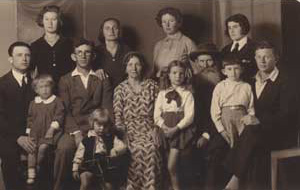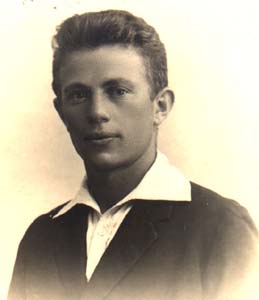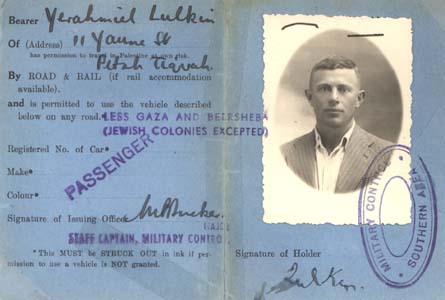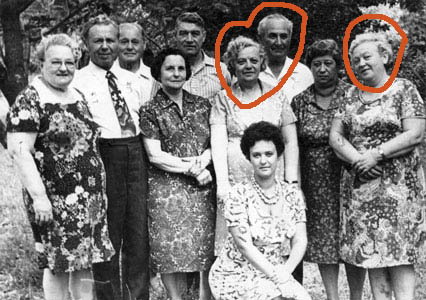|
Life in Kalinovka in the Early 20th Century
Memories of Pinchas Gitner-Lulkin & Chanah Fega Reznik-Lulkin & family as told by Rose Feldman from stories our father told us |
||||||||||
|
||||||||||
|
Our grandfather Pinchas Gitner was born in Litin, Ukraine around 1858 to Yeheskel Gitner and Rachel. Being the second son, he was suppose to be drafted to the Czar’s army. In order to get out of being drafted, he and his parents did what was done by other families at that time. Pinchas was “adopted” by a family who had no sons. The name of the family was Lulkin or Lufka or something similiar. Our grandfather Pinchas continued to go by the family name of Lulkin even after immigrating to Palestine.
At some point our grandfather moved to Kalinovka, a town about the fifth of the size of Litin, according to the 1897 census. We don’t know if it was before he married our grandmother Chanah Fega Reznik in 1882 or after he married her. Her family had been in Kalinovka for a number of generations. Chanah Fega’s father Gadaliah and Pinchas’ father Yeheskel, were probably well acquainted because they were both ‘shochets’ (ritual slaughterers). Our grandfather, Pinchas, was in charge of the oil products depot next to the railroad. This railroad still runs near Kalinovka. Our father, Yerachmiel (Emil), would tell us how his father would come home during the winter with his beard full of icicles and how they would melt when he came into the house. The house had a basement dug into the ground where they would keep barrels of cabbage and other goods as stores for the winter. During the time of the fighting between the government and the revolutionaries, the soldiers would come riding through the town on their horses, killing people in the streets. The family would hide in the dug out basement for days at a time, not venturing out. Once our grandmother, Chanah Fega, was worried about her parents, so she jumped out the window and ran to their house. Since no one dared venture out of the basement, a few days passed till they could find out if she reached her parents’ house safely. Our father, Emil, was the youngest child. His father bought him a lantern of colored glass to light his way home from “hedar”. He told us how the different colored panes of glass would make designs on the snow as he walked home in the dark afternoons of the winter. Our Aunt Shoshana, the oldest sister, went to Odessa for her studies, which meant that this was a progressive household. She studied in the Gymnasia in Odessa until the revolution broke out. Shoshana and her older bother Yeheskel were the first to immigrate to Palestine, around 1923. I don’t know if their other sister, our Aunt Nechama immigrated with them or their parents. Our grandfather, Pinchas, was a member of the Ziiraei Zion movement and immigrated to Palestine with our grandmother Chanah Fega in 1924. |
||||||||||
|
||||||||||
| Our father, Yerachmiel (Emil), was the last to leave. Being active in the zionist movement he wasn’t allowed to leave Russia. His parents sent him a red cross certificate (for two) and he signed that he would never return to Russia. Since the ceritificate was for two, he married a second cousin Dora Reznik (parents – Eliezer Reznik & Sofia Zwaneytky; grandfather Aharon Reznik – brother of our great grandfather Gadaliah Reznik). They arrived in Palestine November 1925 and the marriage was annulled. Our father then went to France to study agriculture. When he returned to Palestine he worked as an overseer for orange groves in Petach Tikva and other places in the country. It is here he met our mother, Judith Epstein, who he married in 1935. | ||||||||||
|
||||||||||
| Our eldest uncle Gershon, stayed in Russia. Gershon was a bookeeper and led the most religious life-style of all the children. According to our father, Gershon was greatly influenced by his grandmother Rachel Gitner,. At the time the family migrated to Palestine, he was married with two daughters just 4-5 years younger than our father. During the period of Stalin before World War II, our parents sent him a package. The story goes, that he went to sell something on the blackmarket and never returned. A distant relative told me that this was in 1937. There has been no contact with the family in Russia for years. But when interviewing David Reznik, our father’s cousin, he gave me a picture taken in 1975 in Russia of his brother and family members. Accrording to the legend on the back of the picture, our two cousins Rachel & Sonia and Sonia’husband Grisha Rudman are in the picture. This is the only picture we have of them. | ||||||||||
|
||||||||||
| As to the fate of the family members that stayed in Kalinovka, David Reznik related the following story to me, which members of his family told him. When the Nazis invaded in the summer of 1941, the family members in Kalinovka got on board the railroad cars and fled to the area of Tashkent. They told him, that the grandparents said they were too old for such a trip, and would wait out their fate in the home town. Nothing else is know about their fate. | ||||||||||



